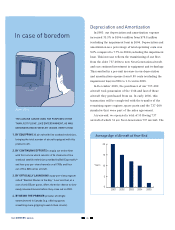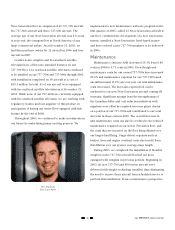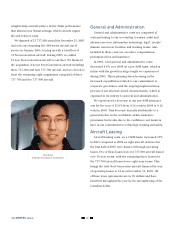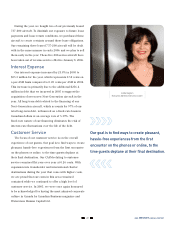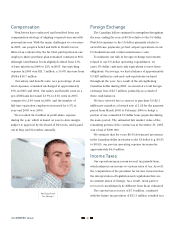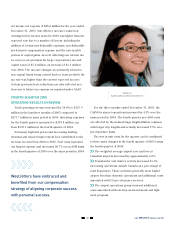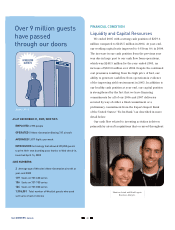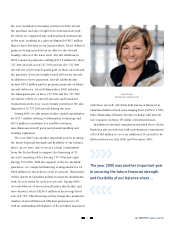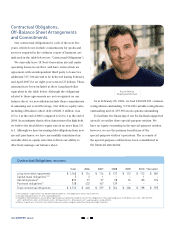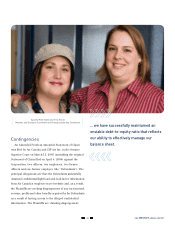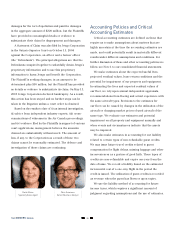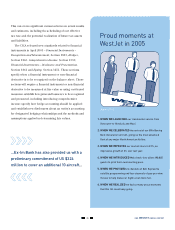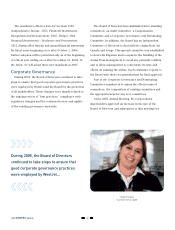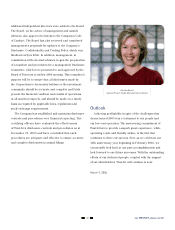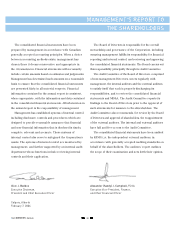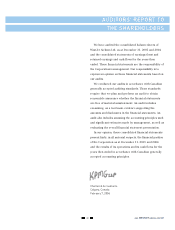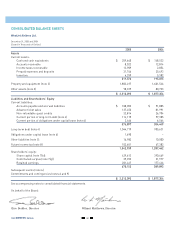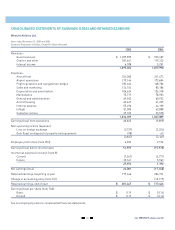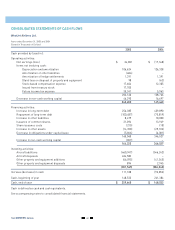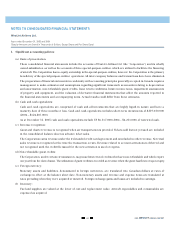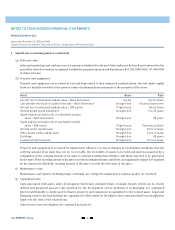Westjet 2005 Annual Report Download - page 36
Download and view the complete annual report
Please find page 36 of the 2005 Westjet annual report below. You can navigate through the pages in the report by either clicking on the pages listed below, or by using the keyword search tool below to find specific information within the annual report.
34
YOUR OWNERS’ MANUAL
damages for the tort of spoliation and punitive damages
in the aggregate amount of $220 million, but the Plaintiffs
have provided no meaningful details or evidence to
substantiate their claim for disgorgement and damages.
A Statement of Claim was also filed by Jetsgo Corporation
in the Ontario Superior Court on October 15, 2004
against the Corporation, an officer and a former officer
(the “Defendants”). The principal allegations are that the
Defendants conspired together to unlawfully obtain Jetsgo’s
proprietary information and to use this proprietary
information to harm Jetsgo and benefit the Corporation.
The Plaintiff is seeking damages, in an amount to be
determined plus $50 million, but the Plaintiff has provided
no details or evidence to substantiate its claim. On May 13,
2005 Jetsgo Corporation declared bankruptcy. As a result,
this action has been stayed and no further steps can be
taken in the litigation unless a court order is obtained.
Based on the results to date of (i) an internal investigation,
(ii) advice from independent industry experts, (iii) cross-
examinations of witnesses in the Air Canada proceedings,
and (iv) evidence filed by the Plaintiffs in support of various
court applications, management believes the amounts
claimed are substantially without merit. The amount of
loss, if any, to the Corporation as a result of these two
claims cannot be reasonably estimated. The defence and
investigation of these claims are continuing.
Accounting Policies and Critical
Accounting Estimates
Critical accounting estimates are defined as those that
require us to make assumptions about matters that are
highly uncertain at the time the accounting estimates are
made, and could potentially result in materially different
results under different assumptions and conditions. For
further discussion of these and other accounting policies we
follow, see Note 1 to our consolidated financial statements.
We make estimates about the expected useful lives,
projected residual values, lease return conditions and the
potential for impairment of our property and equipment.
In estimating the lives and expected residual values of
our fleet, we rely upon annual independent appraisals,
recommendations from Boeing and actual experience with
the same aircraft types. Revisions to the estimates for
our fleet can be caused by changes in the utilization of the
aircraft or changing market prices of used aircraft of the
same type. We evaluate our estimates and potential
impairment on all property and equipment annually and
when events and circumstances indicate that the assets
may be impaired.
We also make estimates in accounting for our liability
related to certain types of non-refundable guest credits.
We may issue future travel credits related to guest
compensation for flight delays, missing baggage and other
inconveniences as a gesture of good faith. These types of
credits are non-refundable and expire one year from the
date of issue. We record a liability based on the estimated
incremental cost of a one-way flight in the period the
credit is issued. The utilization of guest credits is recorded
as revenue when the guest has flown or upon expiry.
We use the liability method of accounting for future
income taxes, which requires a significant amount of
judgment regarding assumptions and the use of estimates.
Darla Silvius
Specialty Sales Agent
Chris Sorensen
Senior Business Analyst


